Christian Vision on Healing and Medical Intervention: A Case Study
VerifiedAdded on 2019/10/01
|5
|1287
|425
Case Study
AI Summary
This case study examines the Christian vision of healing, where prayer is considered a gift from God, and contrasts it with medical interventions. The case revolves around a patient whose family, adhering to their Christian beliefs, ceases medical treatment in favor of prayer, leading to a deterioration in the patient's condition. The assignment analyzes the ethical dilemmas faced by the family, the conflict between their beliefs and the need for medical intervention, and the importance of healthcare professionals respecting patient values while providing information on the benefits of medical treatment. The case highlights the complexities of balancing faith, patient autonomy, and medical advice, presenting a challenge for the family and the healthcare providers in making informed decisions. It emphasizes the need for a balanced approach that considers both spiritual and medical aspects of healing.
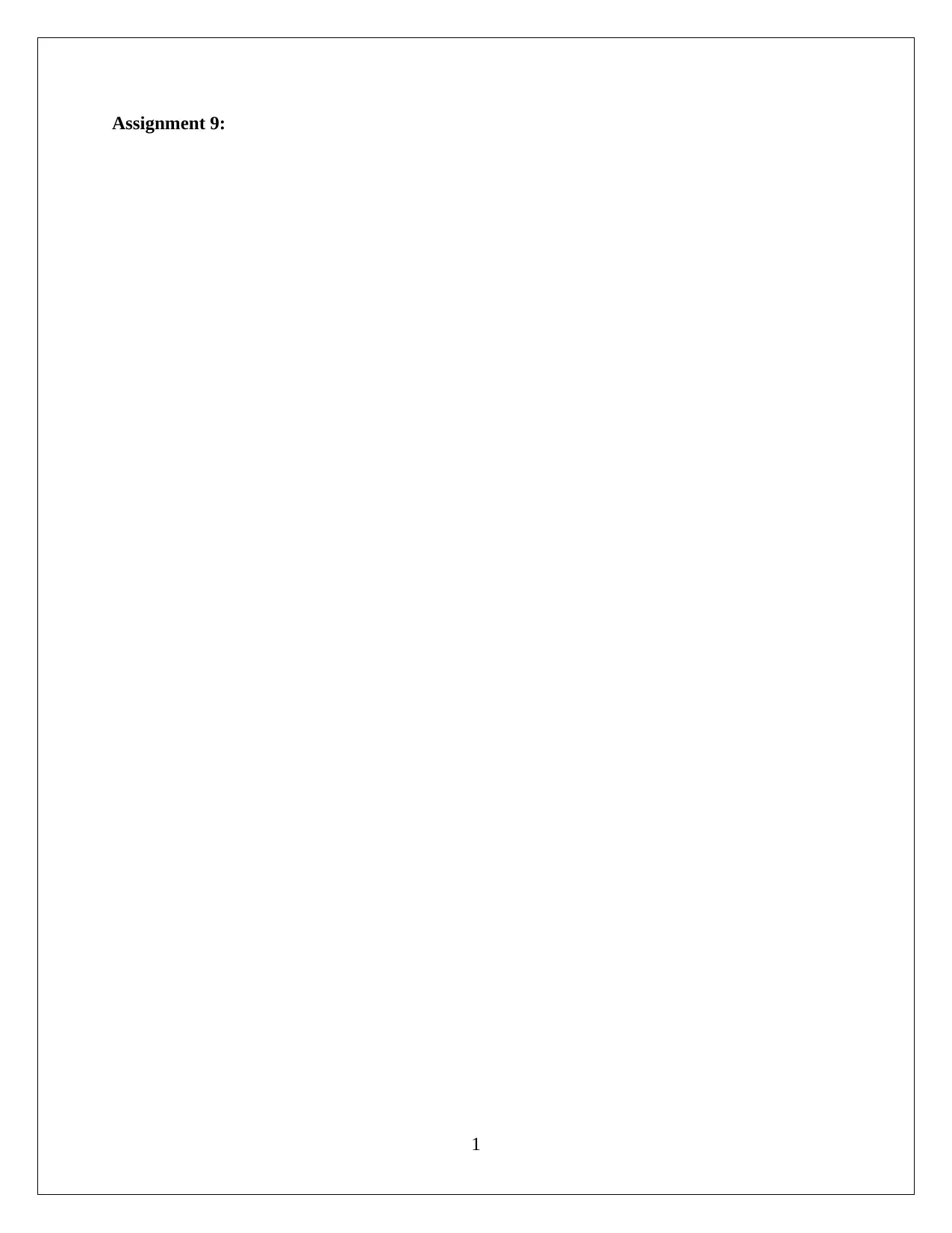
Assignment 9:
1
1
Paraphrase This Document
Need a fresh take? Get an instant paraphrase of this document with our AI Paraphraser
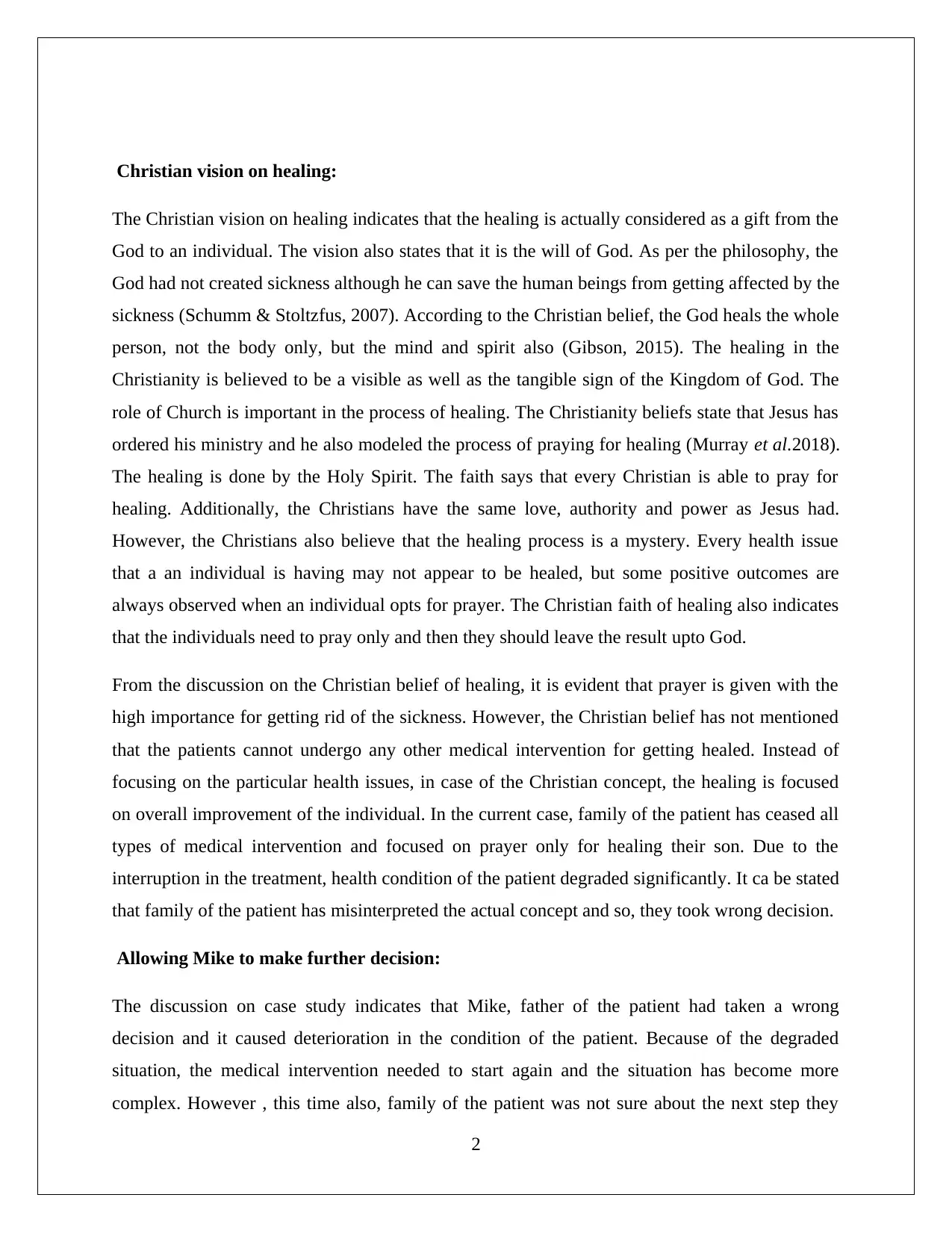
Christian vision on healing:
The Christian vision on healing indicates that the healing is actually considered as a gift from the
God to an individual. The vision also states that it is the will of God. As per the philosophy, the
God had not created sickness although he can save the human beings from getting affected by the
sickness (Schumm & Stoltzfus, 2007). According to the Christian belief, the God heals the whole
person, not the body only, but the mind and spirit also (Gibson, 2015). The healing in the
Christianity is believed to be a visible as well as the tangible sign of the Kingdom of God. The
role of Church is important in the process of healing. The Christianity beliefs state that Jesus has
ordered his ministry and he also modeled the process of praying for healing (Murray et al.2018).
The healing is done by the Holy Spirit. The faith says that every Christian is able to pray for
healing. Additionally, the Christians have the same love, authority and power as Jesus had.
However, the Christians also believe that the healing process is a mystery. Every health issue
that a an individual is having may not appear to be healed, but some positive outcomes are
always observed when an individual opts for prayer. The Christian faith of healing also indicates
that the individuals need to pray only and then they should leave the result upto God.
From the discussion on the Christian belief of healing, it is evident that prayer is given with the
high importance for getting rid of the sickness. However, the Christian belief has not mentioned
that the patients cannot undergo any other medical intervention for getting healed. Instead of
focusing on the particular health issues, in case of the Christian concept, the healing is focused
on overall improvement of the individual. In the current case, family of the patient has ceased all
types of medical intervention and focused on prayer only for healing their son. Due to the
interruption in the treatment, health condition of the patient degraded significantly. It ca be stated
that family of the patient has misinterpreted the actual concept and so, they took wrong decision.
Allowing Mike to make further decision:
The discussion on case study indicates that Mike, father of the patient had taken a wrong
decision and it caused deterioration in the condition of the patient. Because of the degraded
situation, the medical intervention needed to start again and the situation has become more
complex. However , this time also, family of the patient was not sure about the next step they
2
The Christian vision on healing indicates that the healing is actually considered as a gift from the
God to an individual. The vision also states that it is the will of God. As per the philosophy, the
God had not created sickness although he can save the human beings from getting affected by the
sickness (Schumm & Stoltzfus, 2007). According to the Christian belief, the God heals the whole
person, not the body only, but the mind and spirit also (Gibson, 2015). The healing in the
Christianity is believed to be a visible as well as the tangible sign of the Kingdom of God. The
role of Church is important in the process of healing. The Christianity beliefs state that Jesus has
ordered his ministry and he also modeled the process of praying for healing (Murray et al.2018).
The healing is done by the Holy Spirit. The faith says that every Christian is able to pray for
healing. Additionally, the Christians have the same love, authority and power as Jesus had.
However, the Christians also believe that the healing process is a mystery. Every health issue
that a an individual is having may not appear to be healed, but some positive outcomes are
always observed when an individual opts for prayer. The Christian faith of healing also indicates
that the individuals need to pray only and then they should leave the result upto God.
From the discussion on the Christian belief of healing, it is evident that prayer is given with the
high importance for getting rid of the sickness. However, the Christian belief has not mentioned
that the patients cannot undergo any other medical intervention for getting healed. Instead of
focusing on the particular health issues, in case of the Christian concept, the healing is focused
on overall improvement of the individual. In the current case, family of the patient has ceased all
types of medical intervention and focused on prayer only for healing their son. Due to the
interruption in the treatment, health condition of the patient degraded significantly. It ca be stated
that family of the patient has misinterpreted the actual concept and so, they took wrong decision.
Allowing Mike to make further decision:
The discussion on case study indicates that Mike, father of the patient had taken a wrong
decision and it caused deterioration in the condition of the patient. Because of the degraded
situation, the medical intervention needed to start again and the situation has become more
complex. However , this time also, family of the patient was not sure about the next step they
2
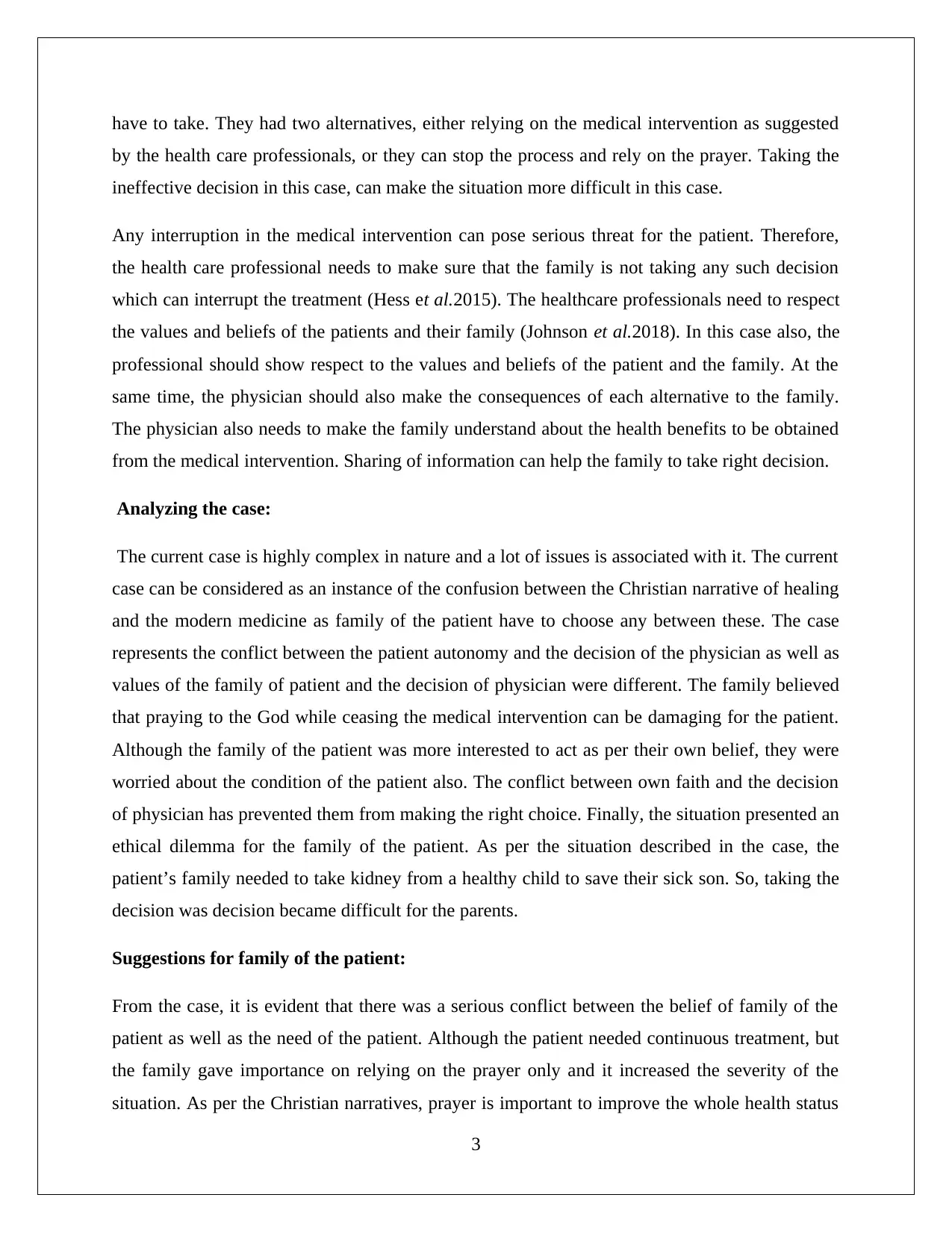
have to take. They had two alternatives, either relying on the medical intervention as suggested
by the health care professionals, or they can stop the process and rely on the prayer. Taking the
ineffective decision in this case, can make the situation more difficult in this case.
Any interruption in the medical intervention can pose serious threat for the patient. Therefore,
the health care professional needs to make sure that the family is not taking any such decision
which can interrupt the treatment (Hess et al.2015). The healthcare professionals need to respect
the values and beliefs of the patients and their family (Johnson et al.2018). In this case also, the
professional should show respect to the values and beliefs of the patient and the family. At the
same time, the physician should also make the consequences of each alternative to the family.
The physician also needs to make the family understand about the health benefits to be obtained
from the medical intervention. Sharing of information can help the family to take right decision.
Analyzing the case:
The current case is highly complex in nature and a lot of issues is associated with it. The current
case can be considered as an instance of the confusion between the Christian narrative of healing
and the modern medicine as family of the patient have to choose any between these. The case
represents the conflict between the patient autonomy and the decision of the physician as well as
values of the family of patient and the decision of physician were different. The family believed
that praying to the God while ceasing the medical intervention can be damaging for the patient.
Although the family of the patient was more interested to act as per their own belief, they were
worried about the condition of the patient also. The conflict between own faith and the decision
of physician has prevented them from making the right choice. Finally, the situation presented an
ethical dilemma for the family of the patient. As per the situation described in the case, the
patient’s family needed to take kidney from a healthy child to save their sick son. So, taking the
decision was decision became difficult for the parents.
Suggestions for family of the patient:
From the case, it is evident that there was a serious conflict between the belief of family of the
patient as well as the need of the patient. Although the patient needed continuous treatment, but
the family gave importance on relying on the prayer only and it increased the severity of the
situation. As per the Christian narratives, prayer is important to improve the whole health status
3
by the health care professionals, or they can stop the process and rely on the prayer. Taking the
ineffective decision in this case, can make the situation more difficult in this case.
Any interruption in the medical intervention can pose serious threat for the patient. Therefore,
the health care professional needs to make sure that the family is not taking any such decision
which can interrupt the treatment (Hess et al.2015). The healthcare professionals need to respect
the values and beliefs of the patients and their family (Johnson et al.2018). In this case also, the
professional should show respect to the values and beliefs of the patient and the family. At the
same time, the physician should also make the consequences of each alternative to the family.
The physician also needs to make the family understand about the health benefits to be obtained
from the medical intervention. Sharing of information can help the family to take right decision.
Analyzing the case:
The current case is highly complex in nature and a lot of issues is associated with it. The current
case can be considered as an instance of the confusion between the Christian narrative of healing
and the modern medicine as family of the patient have to choose any between these. The case
represents the conflict between the patient autonomy and the decision of the physician as well as
values of the family of patient and the decision of physician were different. The family believed
that praying to the God while ceasing the medical intervention can be damaging for the patient.
Although the family of the patient was more interested to act as per their own belief, they were
worried about the condition of the patient also. The conflict between own faith and the decision
of physician has prevented them from making the right choice. Finally, the situation presented an
ethical dilemma for the family of the patient. As per the situation described in the case, the
patient’s family needed to take kidney from a healthy child to save their sick son. So, taking the
decision was decision became difficult for the parents.
Suggestions for family of the patient:
From the case, it is evident that there was a serious conflict between the belief of family of the
patient as well as the need of the patient. Although the patient needed continuous treatment, but
the family gave importance on relying on the prayer only and it increased the severity of the
situation. As per the Christian narratives, prayer is important to improve the whole health status
3
⊘ This is a preview!⊘
Do you want full access?
Subscribe today to unlock all pages.

Trusted by 1+ million students worldwide
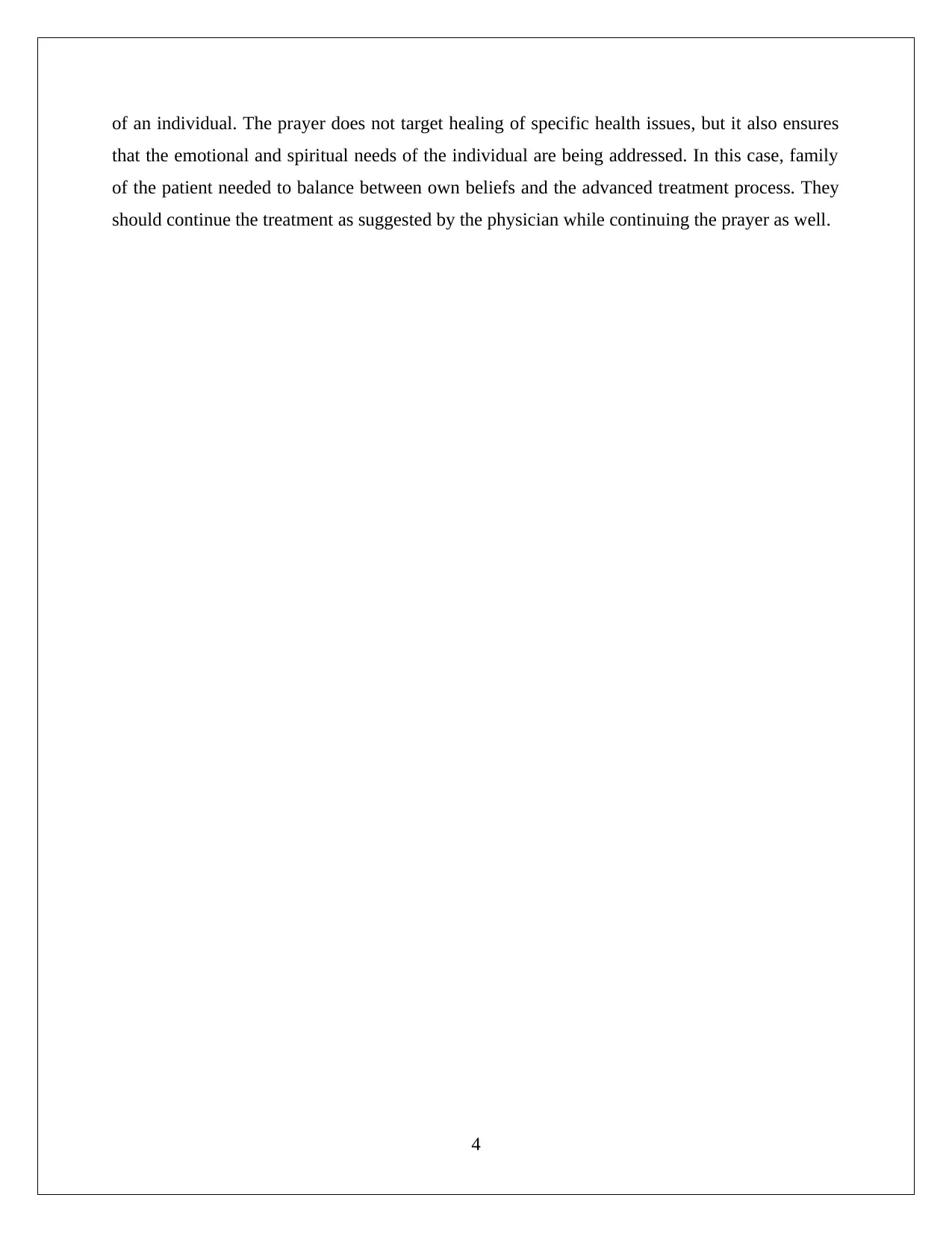
of an individual. The prayer does not target healing of specific health issues, but it also ensures
that the emotional and spiritual needs of the individual are being addressed. In this case, family
of the patient needed to balance between own beliefs and the advanced treatment process. They
should continue the treatment as suggested by the physician while continuing the prayer as well.
4
that the emotional and spiritual needs of the individual are being addressed. In this case, family
of the patient needed to balance between own beliefs and the advanced treatment process. They
should continue the treatment as suggested by the physician while continuing the prayer as well.
4
Paraphrase This Document
Need a fresh take? Get an instant paraphrase of this document with our AI Paraphraser
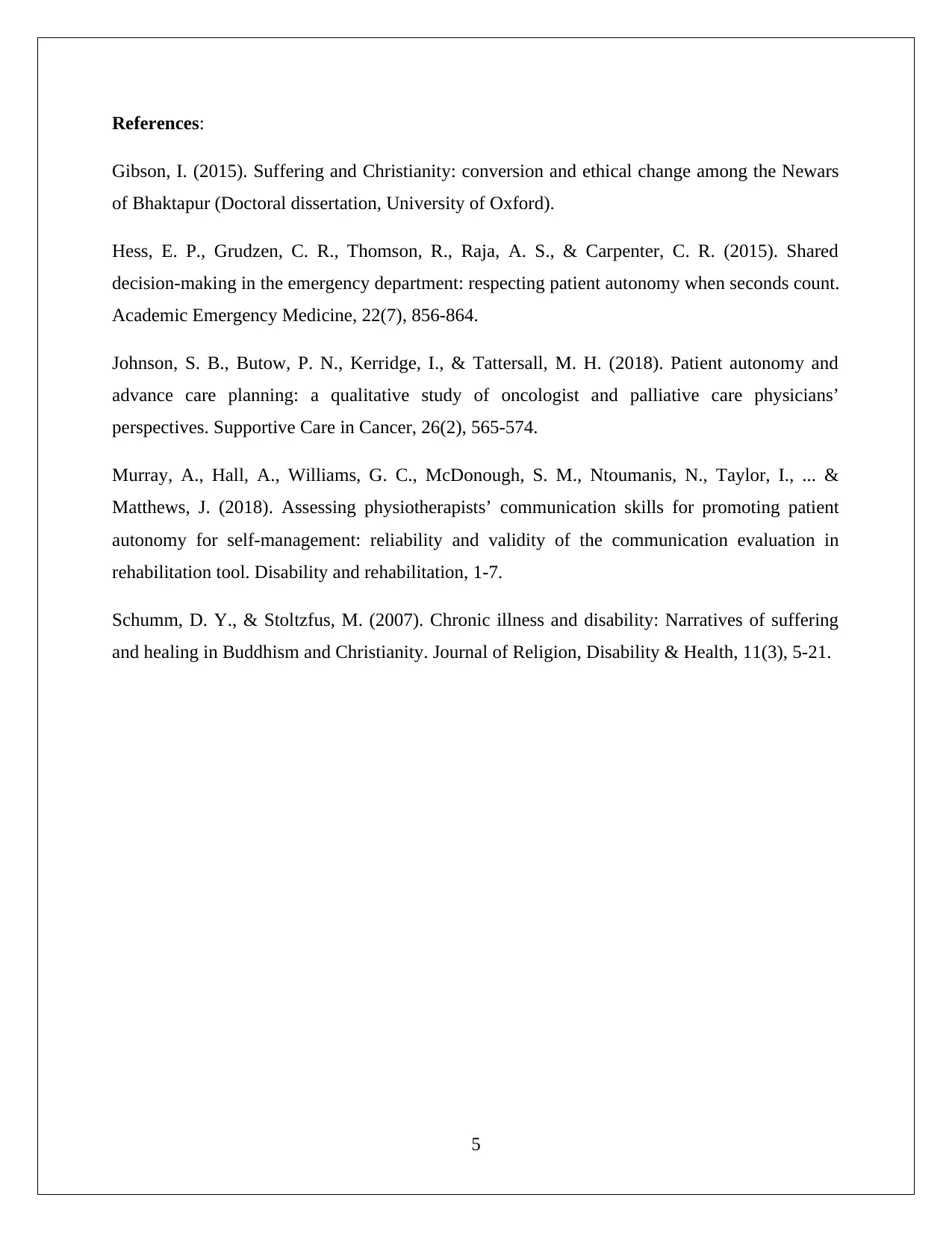
References:
Gibson, I. (2015). Suffering and Christianity: conversion and ethical change among the Newars
of Bhaktapur (Doctoral dissertation, University of Oxford).
Hess, E. P., Grudzen, C. R., Thomson, R., Raja, A. S., & Carpenter, C. R. (2015). Shared
decision‐making in the emergency department: respecting patient autonomy when seconds count.
Academic Emergency Medicine, 22(7), 856-864.
Johnson, S. B., Butow, P. N., Kerridge, I., & Tattersall, M. H. (2018). Patient autonomy and
advance care planning: a qualitative study of oncologist and palliative care physicians’
perspectives. Supportive Care in Cancer, 26(2), 565-574.
Murray, A., Hall, A., Williams, G. C., McDonough, S. M., Ntoumanis, N., Taylor, I., ... &
Matthews, J. (2018). Assessing physiotherapists’ communication skills for promoting patient
autonomy for self-management: reliability and validity of the communication evaluation in
rehabilitation tool. Disability and rehabilitation, 1-7.
Schumm, D. Y., & Stoltzfus, M. (2007). Chronic illness and disability: Narratives of suffering
and healing in Buddhism and Christianity. Journal of Religion, Disability & Health, 11(3), 5-21.
5
Gibson, I. (2015). Suffering and Christianity: conversion and ethical change among the Newars
of Bhaktapur (Doctoral dissertation, University of Oxford).
Hess, E. P., Grudzen, C. R., Thomson, R., Raja, A. S., & Carpenter, C. R. (2015). Shared
decision‐making in the emergency department: respecting patient autonomy when seconds count.
Academic Emergency Medicine, 22(7), 856-864.
Johnson, S. B., Butow, P. N., Kerridge, I., & Tattersall, M. H. (2018). Patient autonomy and
advance care planning: a qualitative study of oncologist and palliative care physicians’
perspectives. Supportive Care in Cancer, 26(2), 565-574.
Murray, A., Hall, A., Williams, G. C., McDonough, S. M., Ntoumanis, N., Taylor, I., ... &
Matthews, J. (2018). Assessing physiotherapists’ communication skills for promoting patient
autonomy for self-management: reliability and validity of the communication evaluation in
rehabilitation tool. Disability and rehabilitation, 1-7.
Schumm, D. Y., & Stoltzfus, M. (2007). Chronic illness and disability: Narratives of suffering
and healing in Buddhism and Christianity. Journal of Religion, Disability & Health, 11(3), 5-21.
5
1 out of 5
Related Documents
Your All-in-One AI-Powered Toolkit for Academic Success.
+13062052269
info@desklib.com
Available 24*7 on WhatsApp / Email
![[object Object]](/_next/static/media/star-bottom.7253800d.svg)
Unlock your academic potential
Copyright © 2020–2025 A2Z Services. All Rights Reserved. Developed and managed by ZUCOL.





